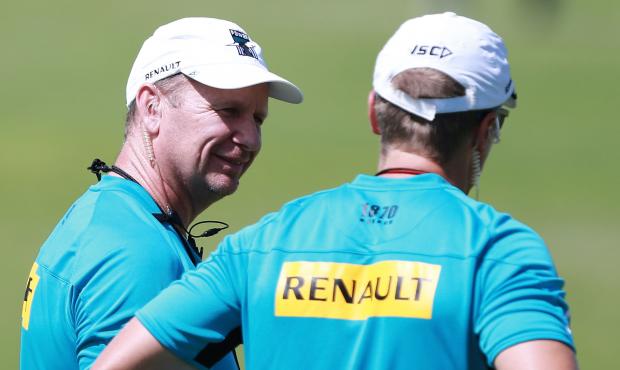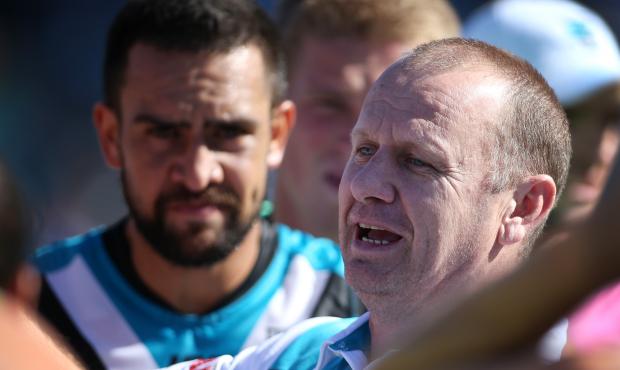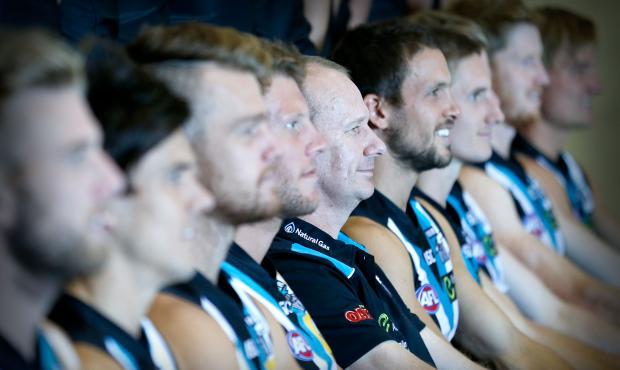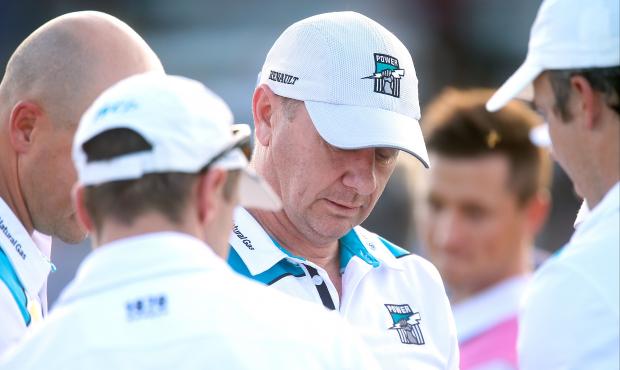ON the eve of Port Adelaide's 2015 season, portadelaidefc.com.au sat down with Ken Hinkley to review the Power's pre-season and how it will set up the club's new campaign.
Little has changed at Port Adelaide for 2015.
Ken Hinkley's still in charge.
The coaching panel has lost Phil Walsh, gained Michael Voss, and Trent Hentschel is a late coaching addition.
No players were traded out, and only Paddy Ryder was brought in along with a number of young (and in the case of Nathan Krakouer, not-so-young) draft talents.
The processes have been refined, the behaviours of the playing group are entrenched.
The expectations placed upon all 45 members of the playing group remain as high as ever.
Yep. Little, seemingly, has changed.
For Ken Hinkley, that's a good thing. There is, however, one thing he wants to be different this year.
Consistency.
He craves it.
That means consistency at training and consistency in preparation. It definitely means consistency of effort and consistency under pressure.
Without it, Port Adelaide cannot expect improvement in games (deficits and come-backs), win-loss records (14-and-8 in 2014) ladder position (fifth at the end of the 2014 season) or its chances against the very best in the league (prelim losses to Hawthorn and no wins against the Swans).
And that, Hinkley will tell you, is what needs to change ...
Matthew Agius: This is your third season at the club, and few would expect Port Adelaide could make a preliminary final and consecutive finals campaigns after coming off six very trying years. But you’re a competitive guy helming a competitive team that lost a prelim final by three points, so how does one approach this pre-season?
Ken Hinkley: For me there were still some real issues inside our game style. It wasn’t quite right and we needed to more time to work with it. At the end of last year, as a coaching group, we were reasonably convinced our game style stood up, but we needed it to stand up under real pressure. Our pre-season view was that not much needed to change, we just needed to sharpen it.
MA: You’ve said before that a team can get to a point where improvement will be minuscule, and take plenty of work to make those small, valuable gains. If you’ve made the leaps and bounds of development in the first two years, surely the small gains you look for now are all about consistency?
Hinkley: It’s the consistency of the behaviour. The behaviours are there, now we need to make sure those behaviours are done at the elite level, under the elite pressure – that’s our challenge – and the gains are much harder to get, because you’re talking about needing to perform every week against the best teams in the competition.
MA: There was a book released a few years ago discussing this idea of ‘anti-fragile’, about creating structures that don’t break or resist pressure, but actually use pressure to improve. Is that what you hope to see from the team now; that it uses pressure to its advantage and gets better from it?
Hinkley: That’s exactly what it should be. It’s being able to perform at the same level through the pressure. The pressure rises, the performance doesn’t drop off. Performance must rise with pressure.

Ken Hinkley and Darren Burgess talk shop during pre-season [pic: AFL Media]
MA: The question on most of your supporters’ lips will be fairly straightforward: are you pleased with the pre-season and the performance of your players?
Hinkley: I’ve been really pleased with the physical performance the players have been able to deliver. That’s the biggest challenge they get in pre-season. But also their willingness to come to each training session with the enthusiasm to do the right thing has been good. That doesn’t mean they always do the right thing, but their willingness to accept feedback has been very important to making sure they get the most out of it. There are many more reviews during pre-season, because we’re not reviewing games, we’re reviewing training. That can be hard work for a player sometimes, but I’m pleased with the way our guys have come with eyes open and ready to learn.
MA: The old local footy adage is you train like you play, but game-like intensity must be tough to replicate at training. How do you do it?
Hinkley: We can’t. We all try to, but it never happens, even in NAB Challenges. You want to go to those levels, but you’ll always fall just short of it.
You’ll see the spike come in Round 1 – not just from us, but from every team in the competition. The first 10 minutes of Round 1 is the most frenetic football you’ll see; full of mistakes. The pressure comes upon you enormously and no one is quite ready for it.
MA: The Power had one win and two losses in the NAB Challenge. What did the coaching panel take out of those games?
Hinkley: Firstly, from a coaching point of view, we thought giving Nicksy the experience of the senior role was a massive win for us. To see him coach the team in his own right, and the way he did it, was extremely satisfying. We could see we had a really good person and he’s got some coaching upside.
From a results point-of-view, win/loss/loss is not what we wanted. We were reasonably happy with our start against West Coast, we took a young side to play Richmond and we got what we wanted out of that, that is to say these young blokes could sit back and think “that’s what it’s about, that’s what it’s like, that’s how hard it is to deliver and why coaches ask me to do these things all the time, every week, all season”. This is why we take the opportunity to give these players the taste in one NAB Challenge game. Until they get a taste of it, they’re never quite sure.
The third game against the Crows, we didn’t perform and didn’t handle the pressure they brought. They were just better than us on the day, and I’m not happy about the way we performed.

Hinkley back in command during the NAB Challenge. He says Port will benefit from Matthew Nicks coaching the first two NAB Challenge games. [pic: AFL Photos]
MA: There was that photo of Dustin Martin giving Darcy Byrne-Jones a ‘don’t argue’ which many outside of the club made a big deal about. How does a young player use something like that to inspire them?
Hinkley: It’s tough because Dusty does that to every player in the AFL. Guys like Darcy shouldn’t be worried about those things too much, other to see that some of the players in the competition are capable of that. The key is to realise the game is that fast - everything is done at a much higher speed and intensity. While players with Darcy’s experience will get a ‘don’t argue’ sometimes, they’ll also get tackled and run out of room quickly. They figure it out though, and the important thing is to go back and learn and keep pushing to perform at the speed of the elite game.
MA: You mention speed. Your mantra is fast, exciting football from defence and many pointed to Port Adelaide’s game last year as the way this sport should be played. Do you expect teams to ‘up’ their speed and, if so, how does Port Adelaide deal with it?
Hinkley: We’ll play the same style of footy. As I say, we’re fine-tuning the way we play and we’re confident it will stand up. We just need to perform it under the most extreme pressure and back it in. We will set up with great defensive structure and great defensive intent to hopefully play our offensive side at speed, which is the way we want to play football. I think the game will continue to be played that way.
MA: Looking to this year, you play 2014’s top-four in the first four rounds and then ice the cake against the Crows in a tough, brutal Showdown. Is it still every game once at a time, or do you personally take a holistic view of the season into account?
Hinkley: Nah. We talk about all the probabilities, possibilities, ‘what ifs’ and ‘what nots’ – they’ll be what they’ll be, but we can’t afford to be distracted from anything that’s not our next game. First up, that’s Round 1.
All of our attention and energy must be focussed on Fremantle. Once that game happens we’ll move forward from there. Footy has a habit of getting you. If you want to look two steps ahead, or five steps ahead, you’ll fall off.
MA: But what if there’s a dip? What if you start the season 0-5? What if you have a mid-season drop in form like the one in 2014? Does the process need to change and adapt, or do you need to stick with what you are doing and be better at it?
Hinkley: Oh, you’ve got to believe in what you do. Stability in any organisation is the key ingredient, and you have to have it. We can lose games at any time, and the reasons why might be in our control or not. You always need to give credit to your opposition about what they can do on certain days. Some days Fremantle might be too good; Hawthorn, Sydney, the Kangaroos and the Crows might just play better football than us. We might get beat by a really good side and might not be able to deliver what we needed because of what they were able to do to us. What we’ve got to make sure we focus on is playing the way we want to play. If we can do that, we give ourselves the best chance to win.
MA: List depth – it’s so important in the modern game. What’s your take on your list three years into your tenure? Has anyone impressed you this pre-season who might not have stood out previously?
Hinkley: I think our depth is really strong, we bat down reasonably low. Sam Colquhoun is one that really excites me, now that he’s off his knee reconstruction. He played 10 games in his first year with us at AFL level, including two finals. I think people forget that. If he didn’t have the injury problems he’s had then potentially he’d have played 30 games of football already and be blossoming. Along with some others like Tom Clurey, Karl Amon, Mason Shaw and Darcy Byrne-Jones, there’s guys like John Butcher, who’s had a great pre-season. There’s many great names we can rattle off, but they need to deliver the consistency of performance.

Depth is very important to Ken Hinkley in 2015. Starting with these guys [Pic: AFL Photos]
MA: Speaking of injuries, you’ve only got three on the list with Shaw, Frampton and Moore, so you’ll have a strong SANFL side against South next week, as well as a healthy AFL one. How important is a strong SANFL side to you?
Hinkley: Massive. I think it’s one of the key ingredients of a successful club. Winning and performing at SANFL level as a football club is equally as important as performing at AFL level. That pressure from underneath helps maintain a healthy, real pressure on the AFL players – they know they need to perform well. Sometimes real pressure is the best thing and for me that means having a group of Magpies playing well, week-in, week-out, deserving to get picked. If you’re not performing at an AFL level, one of those other guys will get picked.
MA: So having an SANFL team make the grand final last year is as indicative of the AFL side’s performance?
Hinkley: I think so. They don’t need to go hand-in-hand, and I’m not saying one can’t be successful without the other, but the best model is both teams performing at a high level, right through the season.
MA: You and others have said a blanket could be thrown over nine teams to fill positions three-to-eight on the ladder. Nine into six doesn’t go. How do you make sure the Power is in the top eight at Round 22?
Hinkley: We turn up every day and work as hard as we possibly can work.
MA: So is that your measuring stick? Because others will measure the club based on its finishing position.
Hinkley: Well that’s the industry. The ladder is everyone’s job review in the footy department. If we finish in a lower position we’ll be seen as being a failure. That pressure is OK. I can’t be any more honest than saying we know that’s what people will mark us by, and I’ll mark us by that. I’ll mark us poorly and I’ll mark myself poorly if we don’t perform the way we should. We’re about winning, and that’s what Port Adelaide does. It marks itself on winning.
MA: The question I finished 2014’s season preview with is the same as the one that I’ll end this year’s: What can Port Adelaide supporters expect to see from Port Adelaide on the field in 2015?
Hinkley: I’ll just say they should expect Port Adelaide tradition.



